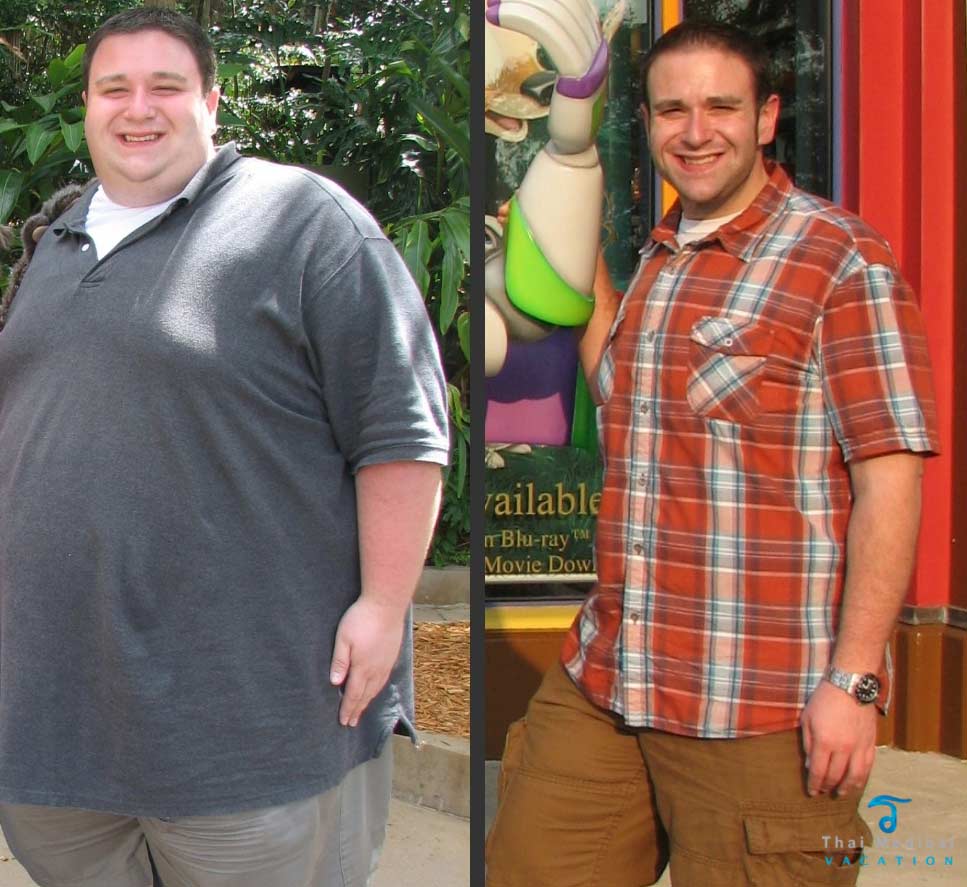Unsurprisingly, the “success” of your gastric sleeve surgery is usually measured in terms of weight loss. After surgery, if you eat right and exercise, you will lose up to 70% of your excess weight in the first year.
For example, if you are 5’ 4” and weigh 220 lbs, you will lose up to 55+ lbs in the first year. If you’re 5′ 9” and weigh 300 lbs, you will lose up to 95+ lbs within 1 year.
Click Here to See How Much Weight You Could LoseRead the sections below for everything you need to know about how much weight you could lose if you have gastric sleeve surgery.
TABLE OF CONTENTS
Click on any of the topics below to jump directly to that section
- Weight Loss Over Time
- Successful Patients and Failed Patients
- How Gastric Sleeve Works
- Before and After Pictures
- The Truth About Weight Regain
- Side Effect Rates
- Complication Rates
- Revision Rates and Options
- Patient Experience & Expert Advice
- Find a Gastric Sleeve Surgeon

SECTION SUMMARY:
- You will lose ~ 70% of your excess weight within 1 year
The fastest period of weight loss is within the first three months. On average, patients will:
- Lose one-half pound a day for the first six weeks (3 to 4 pounds per week)
- Lose one-third of a pound a day for the next six weeks (2 to 3 pounds per week)
Meaningful weight loss is achieved by the vast majority of patients in the short-term. Long-term success rates of gastric sleeve are also impressive. On average, patients maintain excess weight loss of 55% after 5 years.
Average Excess Weight Loss After Gastric Sleeve
For a patient who is 5’ 4” and has a starting weight of 240 lbs, following is the average weight loss over 5 years:
- 3 months – 27 lbs lost (12.2 kg)
- 6 months – 45 lbs lost (20.4 kg)
- 1 year – 63 lbs lost (28.6 kg)
- 3 years – 55 lbs lost (24.9 kg)
- 5 years – 50 lbs lost (22.7 kg)
See our Gastric Sleeve Results page for more information about weight loss and health benefits after gastric sleeve.
SECTION SUMMARY:
- The successful patients commit to long-term diet and lifestyle changes
Most patients are satisfied with their weight loss after gastric sleeve, but some patients struggle. There are important differences between the gastric sleeve success rate of these two groups.
Successful patients will:
- Follow a healthy diet (high in protein, low in carbs, eat only healthy fats)
- Regularly exercise
- Attend follow up appointments with their surgeon
- Eat small portions
- Avoid “cheat meals”
- Take personal responsibility for their own weight loss or gain
Unsuccessful patients will:
- Maintain a “sedentary lifestyle.” Lack of movement/exercise contributes to a slow metabolism and increases the risk of weight regain
- Eat unhealthy foods
- Eat large quantities of foods that stretch the stomach
Main takeaway: The gastric sleeve success rate is directly tied to patient behavior after surgery. Patients who shift their psychology (get motivated!) and make smart dietary decisions will lose an impressive amount of weight and keep it off.
See our Gastric Sleeve Reviews page for real-life stories of successful patients.
SECTION SUMMARY:
- Your surgeon will remove ~80% of your stomach
- Your smaller stomach means you'll feel full sooner while eating and feels less hungry generally, so you'll eat less and lose weight
Surgeons make between 1 and 5 small incisions in the abdomen to access the stomach. The surgeon removes about 80% of the stomach, creating a banana shaped stomach “sleeve” that holds less food. Following surgery, patients feel full sooner while eating.
Gastric sleeve also works by reducing the amount of hunger-causing hormones (ghrelin) the stomach can produce. Think of the stomach as a factory for hormones that cause hunger. Gastric sleeve surgery makes this hunger-hormone factory smaller, helping to reduce food cravings and hunger pain.
See our Gastric Sleeve page for more information on how this surgery works.
SECTION SUMMARY:
- Scroll down to see the 5 sets of photos
See below for weight loss photos of patients before and after gastric sleeve surgery:

Image source: https://scontent.fapa1-2.fna.fbcdn.net

Image source: https://scontent.fapa1-2.fna.fbcdn.net

Image source: http://primesurgicare.com

Image source: http://muscletransform.com

Image source: https://cdn.thaimedicalvacation.com
See our Gastric Sleeve Before and After page for pictures of gastric sleeve patients, including women, men, and celebrities.

SECTION SUMMARY:
- You can regain the weight you lose after gastric sleeve surgery
- The weight regain is usually caused by not following your diet closely
Weight regain happens in about 30% of patients and can start as early as 12-18 months after surgery (2). Around that time, weight loss momentum can slow down, and old habits can re-emerge. Patients are at the highest risk of weight regain for the first 5 years after surgery.
The most frequent causes of weight regain are changes in diet, lack of exercise, and/or food addiction. Fortunately, weight regain can usually be avoided by eating healthy foods in small or medium-sized portions.
Tips To Avoid Weight Regain:
- Use a free diet journal. Tracking your food makes maintaining a healthy diet easier and can contribute to 2x the weight loss (3).
- Maintain healthy sleep patterns. Sleep deprivation makes weight loss more difficult (4).
- See a therapist if you struggle with food addiction issues.
- Begin an exercise routine. Exercise aids in weight loss and improves quality of life.
See our page on Weight Gain After Gastric Sleeve for more information.
SECTION SUMMARY:
- 1 in 5 gastric sleeve patients experience gastroesophageal reflux (GERD) (read details below)
The majority of patients will experience normal, post-surgery side effects. These include mild pain at the site of the incisions, and fatigue for 1-2 days. Fatigue is common due to the impact of surgery and anesthesia (which is required for gastric sleeve).
Other side effects may be a result of the anatomy changes after gastric sleeve. These usually resolve on their own as the body adjusts to the smaller stomach.
Gastroesophageal Reflux (GERD)
Gastroesophageal reflux (GERD), also known as acid reflux, occurs in about 20% of patients after gastric sleeve (5). These symptoms usually resolve on their own, and only 3% of patients report GERD symptoms a year after surgery (6). Treatment includes dietary changes or the use drugs that reduce stomach acid.
Additional Gastric Sleeve Side Effects
- Digestive Issues (gas, nausea, and bloating) – Common side effect
- Usually resolves after the stomach heals and a new diet is implemented.
- Nutrient deficiencies – Common side effect
- Daily multivitamins are strongly advised for all patients following gastric sleeve.
- Sagging skin – Common after significant weight loss
- Treatable with a Tummy Tuck or the use of “slimming clothes.”

SECTION SUMMARY:
- Non-fatal, serious complications occur in 4% of surgeries (read details below)
Gastric sleeve surgery has a 99.7% survival rate.
But like all surgeries, it does carry a risk of complications. Non-fatal serious complications occur in approximately 4% of surgeries.
Reliable treatments are available for post-surgery complications. Compared to other weight loss surgeries like duodenal switch and gastric bypass, the gastric sleeve is lower-risk.
For more information, visit our Gastric Sleeve Complications page.SECTION SUMMARY:
- 4% of weight loss surgeries are a revision of a previous weight loss procedure
Gastric sleeve revisions are when a patient gets a second weight loss surgery after an unsuccessful gastric sleeve. Gastric sleeve revisions are rare, and most patients do not desire or need more surgery. Approximately 4% of weight loss surgeries are revisional (10).
There are three common reasons patients undergo revisional surgery:
- Unsatisfactory Weight Loss: This can result from poor diet or unexpected weight loss setbacks.
- Weight Regain: Approximately 3 out of 10 patients regain weight. Weight regain can be as little as a few pounds, or mean a patient returns to their pre-surgery weight.
- Persistent Side Effects (Rare): The most common side effect that leads to a revisional surgery is gastroesophageal reflux (GERD). Other side effects that lead to gastric sleeve revision are very rare.
There are four gastric sleeve revision options:
- Duodenal switch (best for weight loss)
- Gastric bypass (best for addressing gastroesophageal reflux)
- Re-sleeve (2nd gastric sleeve is performed)
- Lap-Band® (least popular)
For more information about revision options, see our page on Gastric Sleeve Revisions.

SECTION SUMMARY:
- You can read about the experiences of other gastric sleeve patients
- You Can "Ask the Expert"
If you still have questions about gastric sleeve success rate, our experts are happy to answer them. We (and other patients) would also love to hear about your experiences.
Please use the form below to share your experience or ask a question.
Questions From Other Visitors*
Click below to see contributions from other visitors to this page.
Hi, I have questions about sex after weight loss surgery, specifically gastric sleeve. I’ve been with the same man for 5 years, we’re both obese, and we’re both getting gastric…
SECTION SUMMARY:
- You can ask a local bariatric practice for a free insurance check or cost quote
- You can attend a free in-person seminar or an online webinar offered by a local weight loss surgeon
- You should schedule a phone or in-person consultation (both often free), if you are interested in learning more about weight loss surgery



